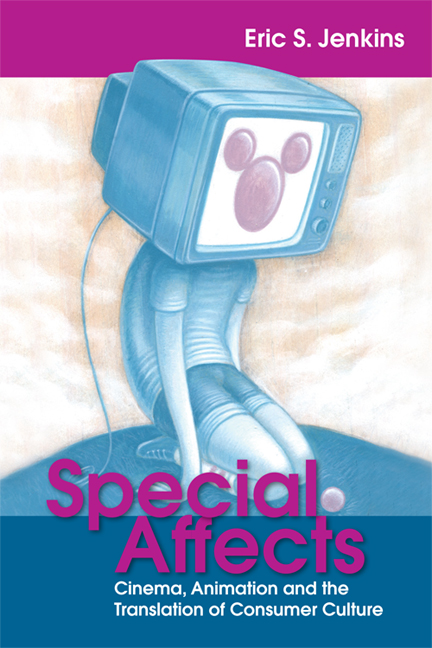Book contents
- Frontmatter
- Contents
- Acknowledgements
- List of Illustrations
- 1 Introduction
- 2 Astonishment and the Fantastic in Live-Action Cinema
- 3 Say Cheese! The Cinematic Lifestyle Consumer
- 4 Animation's Marvel and the Graphic Narrative Mode
- 5 Of Mice and Mimesis: The Wondrous Spark of Disney
- 6 Mutual Affection-Images and Daydreaming Consumers
- 7 The Disney Version of the American Dream
- 8 Walt and Wall-E in Control Society
- Movies Referenced in Special Affects
- Notes
- Index
1 - Introduction
Published online by Cambridge University Press: 05 August 2016
- Frontmatter
- Contents
- Acknowledgements
- List of Illustrations
- 1 Introduction
- 2 Astonishment and the Fantastic in Live-Action Cinema
- 3 Say Cheese! The Cinematic Lifestyle Consumer
- 4 Animation's Marvel and the Graphic Narrative Mode
- 5 Of Mice and Mimesis: The Wondrous Spark of Disney
- 6 Mutual Affection-Images and Daydreaming Consumers
- 7 The Disney Version of the American Dream
- 8 Walt and Wall-E in Control Society
- Movies Referenced in Special Affects
- Notes
- Index
Summary
A consumer boom seems to accompany the emergence of every new communication medium, as the alterations of perceptual capacities transform into habits that subsequently become the source of economic value. Consider how cinema accompanied the growth of the Roaring Twenties, just as television helped fuel the postwar expansion of the 1950s and 1960s. More recently, the Internet spurred the dot-com bubble of the 1990s, one whose short life still resonates today in the proliferation of mobile, networked media. Indeed, digital media remains one of the few briskly expanding and continuously evolving areas of the consumer economy, even in the midst of a seemingly never-ending recession and its repeated belt-tightening. Furthermore, commentators frequently connect media to consumerist ideology, especially that old standby ideograph, the American Dream. Cinema, television and the Internet alike are penned and pinned as prime representatives of either the continued reality of, or the misleading illusion called, the American Dream.
Today, the air seems tinged with a pessimism about consumerism that contrasts with the bountiful optimism of earlier periods. More and more people feel that the American Dream lies in ruins, with some recognising how consumerism pulls the levers behind environmental extirpation and societal oppression. Yet nevertheless, media consumption grows apace, perhaps because our proliferating, always-at-hand media devices mask this stark reality or, at the least, provide us with some measure of escapist joy when the aching sadness innervated by the avalanche of bad news proves too much to bear. We should ask, then, how did media and consumerism become such accomplices? How can we explain this linkage between media and consumerism? When did their association begin and why do the two seem so inextricably interconnected today?
Scholars, those whose modes of long, reflective thinking potentially render them the best equipped for making sense of these connections, have recently offered two concepts for understanding our ongoing sociocultural changes – affect and the cyborg (or, alternatively, the posthuman or virtual body). Affect is all the rage, with critical scholars proclaiming an affective turn that shifts the focus from the emphasis on language, ideology and subjectivity to one centred on experience, on embodiment, on the intensities of sensation and the flows of energy that leap from body to body and that provide the texture and tone of lived experience.
- Type
- Chapter
- Information
- Special AffectsCinema, Animation and the Translation of Consumer Culture, pp. 1 - 26Publisher: Edinburgh University PressPrint publication year: 2014



